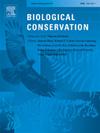Corporate biodiversity information disclosure in focus: The triad of institutional pressures, ecosystem service and green supply chain management in China's corporate landscape
IF 4.4
1区 环境科学与生态学
Q1 BIODIVERSITY CONSERVATION
引用次数: 0
Abstract
The ongoing reduction in biodiversity poses a risk to ecosystem stability and indicates an overall breach of the planet's limits. Every business organization relies, either directly or indirectly, on the extent of biodiversity; however, research is insufficient regarding the factors and mechanisms that determine why and how companies effectively disclose biodiversity information, especially within the context of China. Therefore, to address this research gap, this study takes a sample of 493 Chinese firms and employs structural equation modeling to conduct empirical analysis. The empirical results indicate that the three types of institutional pressure (coercive pressure, normative pressure, and mimetic pressure) all promote corporates in disclosing biodiversity information. In addition, coercive pressure, normative pressure, and mimetic pressure are all capable of promoting corporate ecosystem service management and green supply chain management, and both corporate ecosystem service management and green supply chain management facilitate the disclosure of biodiversity information by corporates. Furthermore, the mediating roles of both corporate ecosystem service management and green supply chain management have been validated, and the difference in the mediating effects of these two variables has not reached a significant level. This study not only contributes to the academic discourse on corporate biodiversity information disclosure but also provides practical insights for stakeholders committed to promoting sustainable business practices and sustainable development, as well as offering a reference for policy optimization and formulation.
企业生物多样性信息披露焦点:制度压力、生态系统服务与绿色供应链管理在中国企业格局中的三重作用
生物多样性的持续减少对生态系统的稳定构成了威胁,表明地球已经全面突破了极限。每个商业组织都直接或间接地依赖于生物多样性的程度;然而,关于企业为何和如何有效披露生物多样性信息的因素和机制的研究还不够,特别是在中国的背景下。因此,为了弥补这一研究空白,本研究以493家中国企业为样本,采用结构方程模型进行实证分析。实证结果表明,三种类型的制度压力(强制压力、规范压力和模仿压力)都促进了企业披露生物多样性信息。此外,强制压力、规范压力和模仿压力都能够促进企业生态系统服务管理和绿色供应链管理,企业生态系统服务管理和绿色供应链管理都有利于企业生物多样性信息的披露。此外,企业生态系统服务管理和绿色供应链管理的中介作用均得到了验证,两者的中介作用差异未达到显著水平。本研究不仅有助于企业生物多样性信息披露的学术论述,而且为致力于促进可持续商业实践和可持续发展的利益相关者提供实践见解,并为政策优化和制定提供参考。
本文章由计算机程序翻译,如有差异,请以英文原文为准。
求助全文
约1分钟内获得全文
求助全文
来源期刊

Biological Conservation
环境科学-环境科学
CiteScore
10.20
自引率
3.40%
发文量
295
审稿时长
61 days
期刊介绍:
Biological Conservation is an international leading journal in the discipline of conservation biology. The journal publishes articles spanning a diverse range of fields that contribute to the biological, sociological, and economic dimensions of conservation and natural resource management. The primary aim of Biological Conservation is the publication of high-quality papers that advance the science and practice of conservation, or which demonstrate the application of conservation principles for natural resource management and policy. Therefore it will be of interest to a broad international readership.
 求助内容:
求助内容: 应助结果提醒方式:
应助结果提醒方式:


